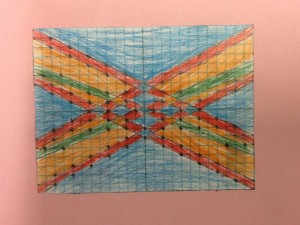Cameron Bates
PreAP English 1
5-6-15
Poem Comparison Essay
“Richard Cory” and “The Unknown Citizen” are both intelligent and creative examples of how a man’s happiness is not shown through objects or everyday actions. Auden’s poem shows that even through a life of living how the government wants and staying within the status quo does not give one’s life a sense of meaning or happiness, while Robinson’s “Richard Cory” shows that a life of riches and wildest dreams fulfilled does not make up for the deprivation of friends and family. The theme of a “perfect” person may be compared by actions the men have, the thoughts people had about them, and the ironic ending.
The importance of appearance is portrayed in these two poems by the actions the two men took. For example, in “Richard Cory”, the man “was a gentleman from sole to crown” and “he glittered when he walked.” Richard Cory made his outward self show people what he wanted them to see, know, and feel about him, but not what he was actually going through. Similarly, in “The Unknown Citizen” the government wanted its citizens to follow a status quo and not be original and he followed this. “He worked in a factory and never got fired” and “added five children to the population…our Eugenists says that’s the right number for a parent of his generation.” The man wants to be perfect and have everyone see him as a perfect man just like Richard Cory was seen Thus, both men showed the importance of appearance through their actions.
The citizens in “Richard Cory” and the government in “The Unknown Citizen” are similar through their admiration of the men. For example, the citizens in “RIchard Cory” see him as a “human when he talked, but was richer than a king” and “[we] thought that he was everything.” The citizens admired him and wanted to be like him and have all that he had. Similarly, the government in “Unknown Citizen” saw him as the perfect role model for the other citizens. “He was fully sensible to the advantages of the Installment Plan” and “that he held the proper opinions for the time of year.” He was the citizen the government wanted him to be. He did what he was supposed to and when being the perfect man to the government as RIchard Cory was to the citizens. Thus, the importance of appearance towards these groups of people is similar through the thoughts and explanations of how the two men acted.
The ironic endings in both poems show how the importance of appearance towards these two men meant nothing because of their lack of happiness. To illustrate, in “Richard Cory,” he was a rich, noble man who seemed fine, but “went home and put a bullet through his head.” Everyone believed that he had a perfect life based on his appearance and objects, but he was sad and lonely. Similarly, in “Unknown Citizen,” he did everything he was supposed to do, but he didn’t enjoy life. “Was he free? Was he happy? …had anything been wrong, we should certainly have heard.” The government thought he had a perfect life, but, in reality, he was unsatisfied with his life. Thus, both men had an outward appearance of a king, but inwardly hated life.
Therefore, both poems show how appearances mean nothing towards a person’s life, in that it doesn’t affect a person’s actions or the thoughts other people have of them. While both authors depict a man respected and envied, they also describe a man unhappy and without a desire to continue on in life. Many people wear masks to hide their true feelings and many times these are the very objects that are meaningless to having a good, fun, and fulfilled life.

